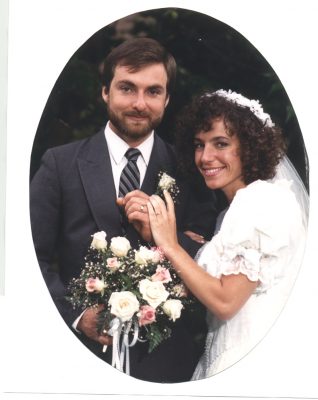UPDATED 20Jun2020: In the last few days of May 1988, I was a few weeks away from getting married. That’s Mary and I in the photo below on June 4 of that year. As I was preparing mentally for the big day, I talked to a couple who’d been married for 10 years. “What is marriage really all about?” I asked. “What’s the essential nature of marriage?” Both of them thought for a few minutes. The man, Francis, then said he’d get back to me. I’m still waiting to hear from him.

I’m not surprised that Francis is taking his time answering because it has taken me a long time to figure out my own answer. I offer what I’ve discovered in the hope that it might prove useful to someone, someday, somewhere. But to understand what marriage is really all about, you first need to understand what love is. The English word for love means too many things to be useful without some explanation. And the working definition of “love” has changed quite a bit over the last couple of decades. It’s a shame we don’t have more common and stable language for all the different kinds of love, but I’ve found one definition that cuts through a lot of confusion for me – at least as far as love in the context of marriage is concerned:
“Love is the willingness to cheerfully and consistently put the happiness and well-being of another person ahead of your own.”
Ultimately, love is not a feeling. People don’t fall in love and out of love so much as they fall in and out of fond feelings of so-called “love”. I’ve discovered that the best marriages are built on the intention of a lifelong commitment to lavish true, selfless love on your spouse, even when it gets in the way of your own needs and wants. And yes, even when your spouse doesn’t always offer love in return. This is real love and it isn’t always easy to live out. Could it be that one reason lifelong marriage commitments are becoming much more rare is that selflessness is going out of style across society?
Ya, But . . .
You might say: “Sounds good, what about me and my needs? If I don’t stand up for what’s coming to me in marriage, no one else will!” That’s an understandable sentiment, and I guess you’ll need to figure the implications out for yourself. But this sentiment also misses something vital. The beauty of love is best viewed from outside ourselves, not from inside our heads and hearts as we’re living them. While the most harmonious marriages everywhere are always those where both spouses consistently put the other first in a selfless loving relationship, is it not also breathtakingly beautiful when selflessness is cheerfully delivered without equal treatment? I’m not talking about physically dangerous situations here, so set that concern aside for a moment and consider a question.
When both people in a marriage are dead and gone, and all that remains are memories of their lives as viewed through the eyes of eternity, which person will be remembered as brighter and more impressive? Is it the one who loved even when it hurt, or the one who looked out primarily for themselves and their own needs? They say that what really counts in life is not what we do for ourselves, but what we do for others. I’m inclined to believe this even if I do forget it sometimes. It helps me when I remember how a long time ago a wise man wrote how love is patient, kind, humble and selfless. Love is never offended, never rude, never jealous nor boastful. Love never seeks its own way.
Encouragement is love cheering, and that’s what I hope this note will be for you – encouraging. May these thoughts carry you through those inevitable times when you might need to be reminded what marriage is really all about, especially in a world where old fashioned ideas about love and commitment and selflessness are laughed at, derided, and in the minds of many being quickly relegated to the status of old fashioned or even harmful.
One last thing . . . Real love in a marriage context is like a wood stove. You’ve got to put something in if you want the warmth, comfort and glowing cheer to come out. Sounds simple, but is it not true that the most powerful ideas in life usually are?